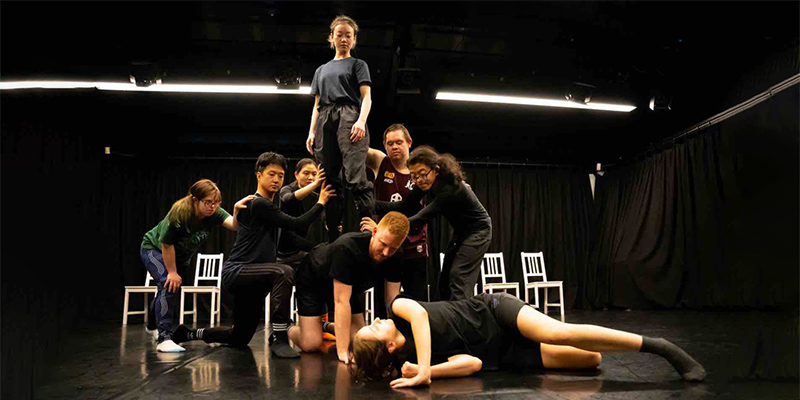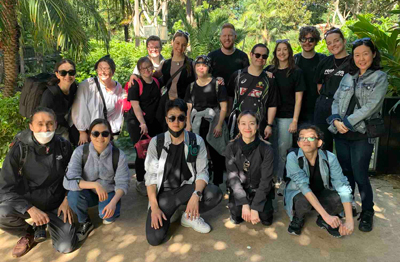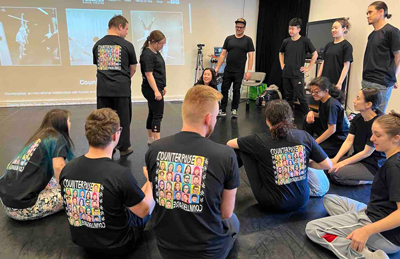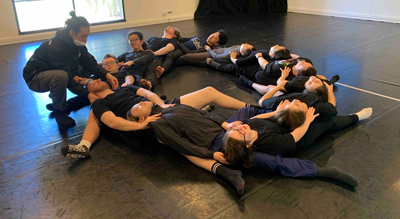Performers from Korea and Australia unite for an international celebration of artists with disability
By Dan Lander
 BUSINESS AND LAWDancers from Seoul’s 29Dong Dance Theatre and Adelaide's Restless Dance Theatre.
BUSINESS AND LAWDancers from Seoul’s 29Dong Dance Theatre and Adelaide's Restless Dance Theatre.UniSA researchers have hosted performers from Australia and South Korea as part of a collaboration bringing together dancers and musicians with and without disability.
 December’s visit was the first face-to-face meeting between the performers since the pandemic began.
December’s visit was the first face-to-face meeting between the performers since the pandemic began.Dancers from Seoul’s 29Dong Dance Theatre and musicians from the K-Music Makers joined members of Restless Dance Theatre for a two-week session in Adelaide as part of an ongoing international project called Counterpoise.
Supported by the Department of Foreign Affairs and Trade’s Australian Cultural Diplomacy Grants Program, the Australia-Korea Foundation, and Arts Council Korea, Counterpoise is the centrepiece for a documentary series called Dancing Against the Odds, which is being co-produced by UniSA arts management experts Professor Ruth Rentschler and Dr Boram Lee.
“This project celebrates diversity and inclusion, self-expression and individuality, not just in the arts, but throughout society – it shifts attitudes about capabilities of artists with disability,” Prof Rentschler says.
 The performers and researchers took time out to visit Adelaide Zoo.
The performers and researchers took time out to visit Adelaide Zoo.“All the artists, whether they live with disability or not, are devoted to showing the rich benefits that come from embracing the tailored support that sees their artistic careers blossom and allows those careers to be sustained for the long term.
“We’re so excited to be bringing together these amazing artists from Korea with members of South Australia’s own artistic community to celebrate such an uplifting, inclusive project.”
While it was the first time that members of Restless Dance Theatre, 29Dong Dance Theatre and the K-Music Makers have met since the start of the COVID-19 pandemic, the three companies have been collaborating since 2020 through a digital platform called Connect2Abilities.
Connect2Abilties was developed by Prof Rentschler and Dr Lee as a way of fostering a sense of community and belonging between international artists during the pandemic.
 Rehearsals were held at Restless Dance Theatre in Adelaide.
Rehearsals were held at Restless Dance Theatre in Adelaide.“The restrictions of the past few years have been hard for everyone in the arts community, even more so for those artists who are working to shift mainstream perceptions about disability, diversity and inclusion,” Dr Lee says.
“We developed the Connect2Abilities platform as a way to ‘connect people to people’ across international borders, to help ensure that those artists who are working to foster an inclusive society through diversity in the arts didn’t feel lost or alone.
“One of the really positive outcomes of this project has been it has brought far more opportunities than challenges, connecting people in ways that weren’t previously possible. To see the fruition of that as these artists came together is a really rewarding experience.”
 The two-week session culminated in a showcase performance.
The two-week session culminated in a showcase performance.The two-week session culminated in a showcase event on 9 December, and outcomes from the Counterpoise project will feature at major festivals in Australia and South Korea in 2023 and beyond, with the entire journey captured for the Dancing Against the Odds documentary series.
Short preview videos from the rehearsal sessions are available on the Connect2Abilities website and Facebook account.
In addition to production from Prof Rentschler and Dr Lee, Dancing Against the Odds will feature the work of Adelaide filmmaker Matt Byrne, who says the documentary will challenge people’s stereotypes of what artists with disability can achieve in their careers.
“The chance to document the journey of these amazing artists will provide an insight to the audience as to how these individuals have overcome both geographic and language barriers, and the further obstacles placed in their lives during the pandemic, in order to work together and co-develop an expressive dance piece,” Byrne says.
“Documentary filmmaking is often about enabling the pictures to do the talking, and in the same way Connect2Abilities is bringing artists together to communicate visually through dance theatre, which can be one of the most powerful forms of non-verbal communication.”
Other Stories
- Trouble sleeping? You could be at risk of type 2 diabetes
- UniSA welcomes female high-flyers and second jetliner simulator
- Students bring Adelaide Gaol to life through augmented reality app
- We’re told to ‘eat a rainbow’ of fruit and vegetables. Here’s what each colour does in our body
- From the Vice Chancellor
- Achievements and Announcements December 2022
- Two new videos help tell UniSA’s unstoppable story
- Six UniSA students set for adventure of a lifetime on New Colombo Plan scholarships
- Performers from Korea and Australia unite for an international celebration of artists with disability
- In Pictures: UniSA Research and Enterprise Awards
- The latest books from UniSA researchers December 2022




